|
AGORA - Philosophical Topics Important thinkers on important life-issues |
- Attitudes
- Authenticity
- Death
- Philosophizing
- Friendship
- Beauty
- Happiness
- Inner Freedom
- Inner Truth
- Love
- Meaning
- Music
- Right & Wrong
- Romantic Love
- Sex
- Solitude
- Sublime
- The Other Person
This month's topic: RIGHT AND WRONG
What is the right thing to do?
WEEK 1 - Bentham WEEK 2 - Kant WEEK 3 - Beneke WEEK 4 - Ross An issue for reflection
WHAT IS THE RIGHT THING TO DO?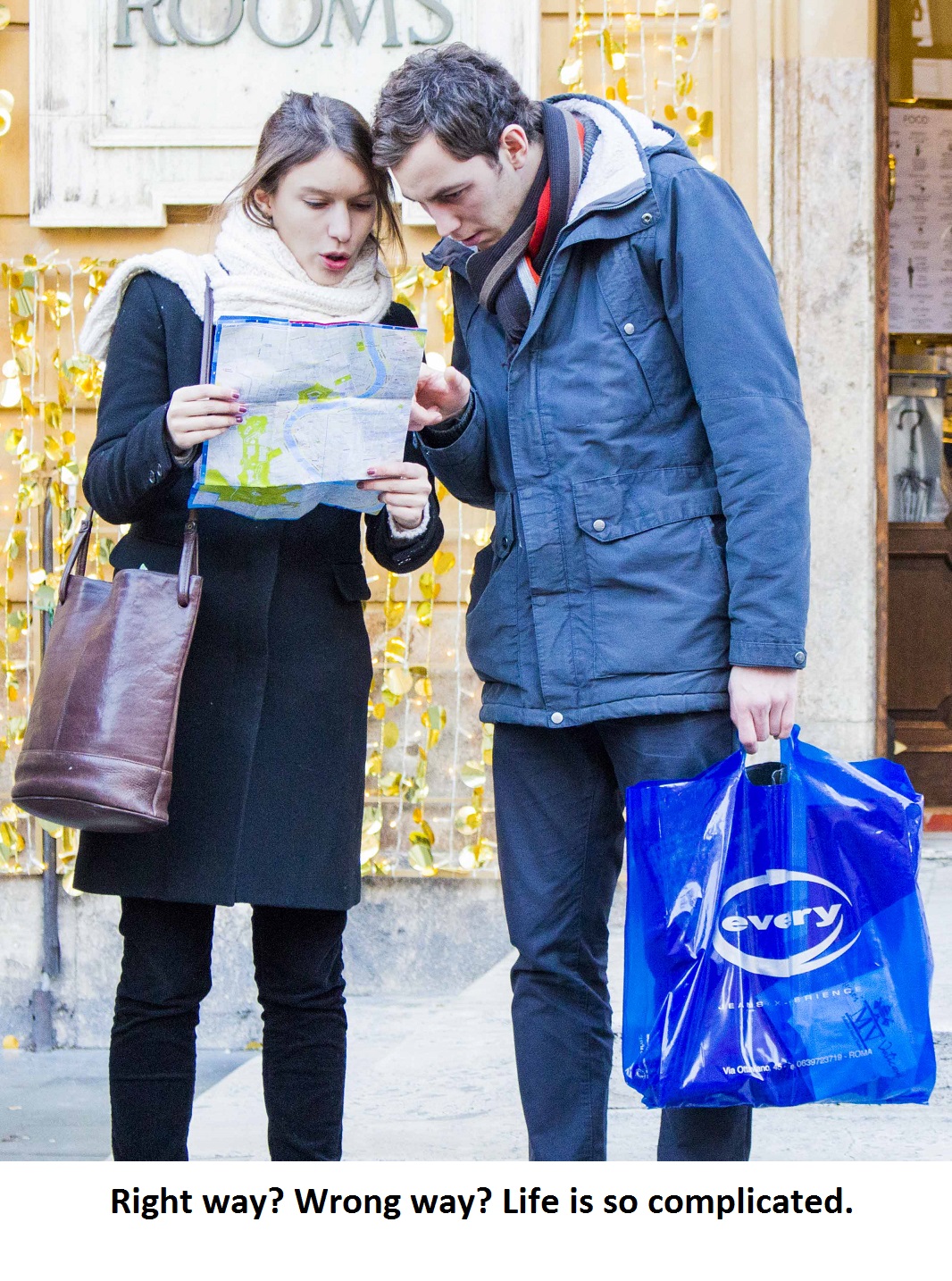
- You took Linda’s books without her permission. Was this a right thing to do?
- She will never find out.
- Are you saying that it’s OK to steal, as long as the owner doesn’t know?
- Well, no. My point is that it didn’t feel wrong to me. She never reads her books anyway, so I felt comfortable taking them.
- Are you saying that what FEELS right is IN FACT right? That it’s alright to steal – or abuse or kill – if you feel good about it?
- No, of course not. Feelings are not enough to make something right or wrong. Otherwise, criminals could claim that what they are doing is right because they feel good about it.
- Alright, so what makes an action right? How do we decide whether it would be right or wrong to do what we want to do?

JEREMY BENTHAM
Right actions bring happiness
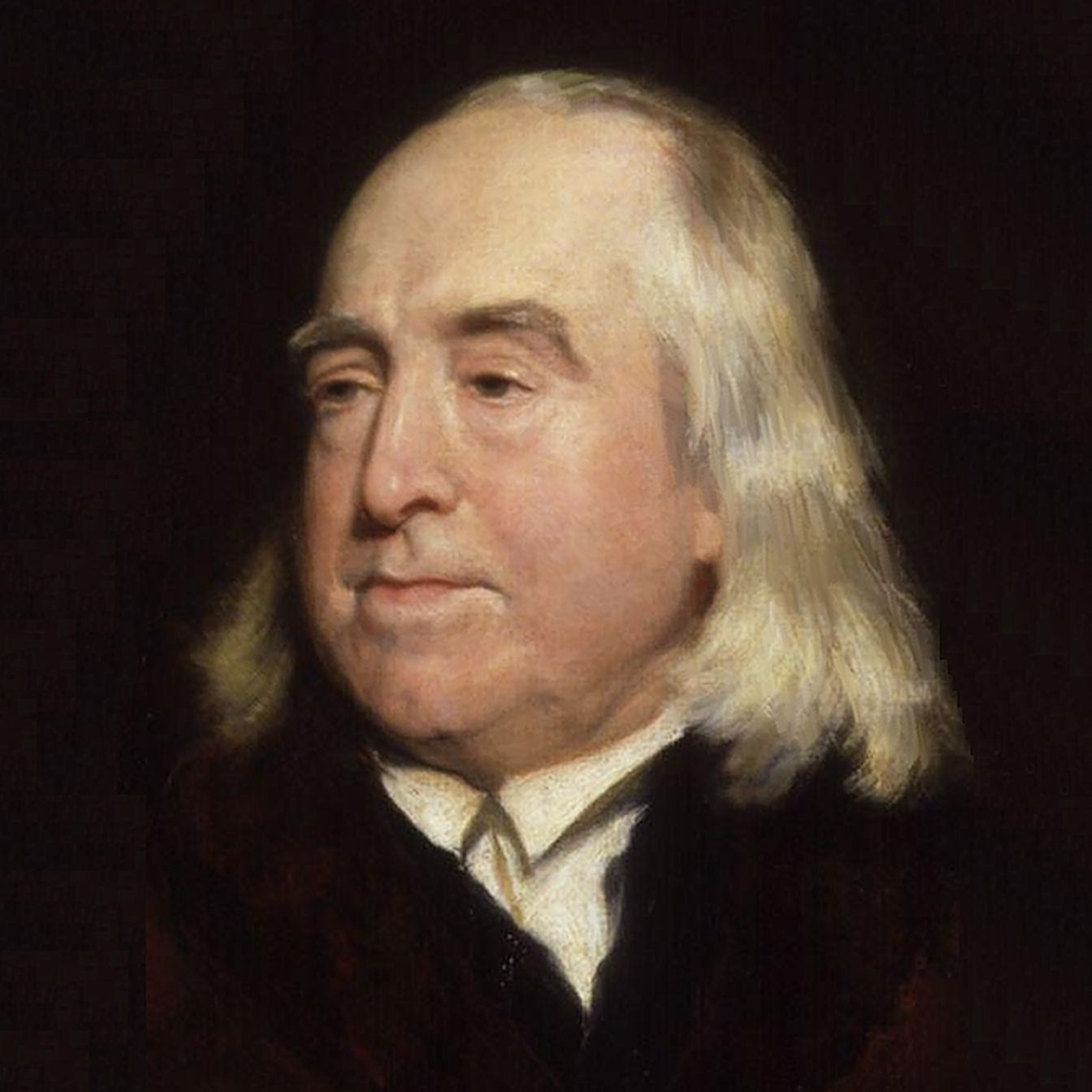 Jeremy Bentham (1748-1832), an English philosopher and social reformer, was one of the main thinkers in the history of modern ethics. He was the first to formulate the principles of Utilitarianism, according to which actions are right or wrong depending only on the happiness (“utility”) or unhappiness which they produce. This idea was later developed by his student, the philosopher John Stuart Mill, so that philosophers nowadays often quote Mill more than Bentham.
Jeremy Bentham (1748-1832), an English philosopher and social reformer, was one of the main thinkers in the history of modern ethics. He was the first to formulate the principles of Utilitarianism, according to which actions are right or wrong depending only on the happiness (“utility”) or unhappiness which they produce. This idea was later developed by his student, the philosopher John Stuart Mill, so that philosophers nowadays often quote Mill more than Bentham.
Bentham was born in London to a rich family, and as a little child showed special intellectual abilities. He studied law, and later envisioned several social reforms regarding prisons, human rights, and other matters. At first his ideas were not appreciated, but later in life his influence on British society grew. He corresponded with many thinkers, wrote many books, and founded an influential journal. He died at the age of 84, leaving behind thousands of written pages.
The following text is adapted from Chapter 1 of Bentham’s book An Introduction to the Principles of Morals and Legislation (1789). Here Bentham defines the basic principle of the Utilitarian approach, the principle of utility: that expected pleasure (or happiness) is what (a) determines whether an action is morally right or wrong, and (b) motivates people to act. An action is morally right, therefore, if it maximizes the pleasure (or happiness, or what he calls “utility”) of the people involved.
I. Nature has placed mankind under the rule of two sovereign masters: pain and pleasure. It is only these two that point out what we OUGHT to do, and also to determine what we SHALL do. Attached to their throne are, on the one hand the standard of right and wrong, and on the other hand the chain of causes and effects. They govern us in everything we do, in everything we say, in everything we think. Every effort we can make to throw off their rule will only serve to demonstrate and confirm this. A person may pretend in words to reject their empire, but in reality he will remain subject to it. The principle of utility recognizes this subjection, and it makes it the foundation of that system – whose goal is to nurture the fabric of happiness with the hands of reason and of law. Systems which attempt to question this principle, deal with sounds instead of sense, with caprice instead of reason, with darkness instead of light.
But enough of metaphor and poetics! It is not by such means that moral science is to be improved.
II. The principle of utility is the foundation of the present work: It will be proper, therefore, to start with an explicit and determinate account of what it means. The principle of utility is the principle which approves or disapproves of any action whatsoever according to the tendency which it seems to have to increase or decrease the happiness of the people under consideration. Or, what is the same thing in other words: to promote or to oppose that happiness. I say “any action whatsoever,” and therefore not only actions of a private individual, but also every act of government.
III. By “utility” I mean that property of any object which tends to produce benefit, advantage, pleasure, good, or happiness (all this comes to the same thing) or (what comes again to the same thing) to prevent the happening of mischief, pain, evil, or unhappiness to the people under consideration. If they are the community in general, then the happiness of the community; if it is a particular individual, then the happiness of that individual.
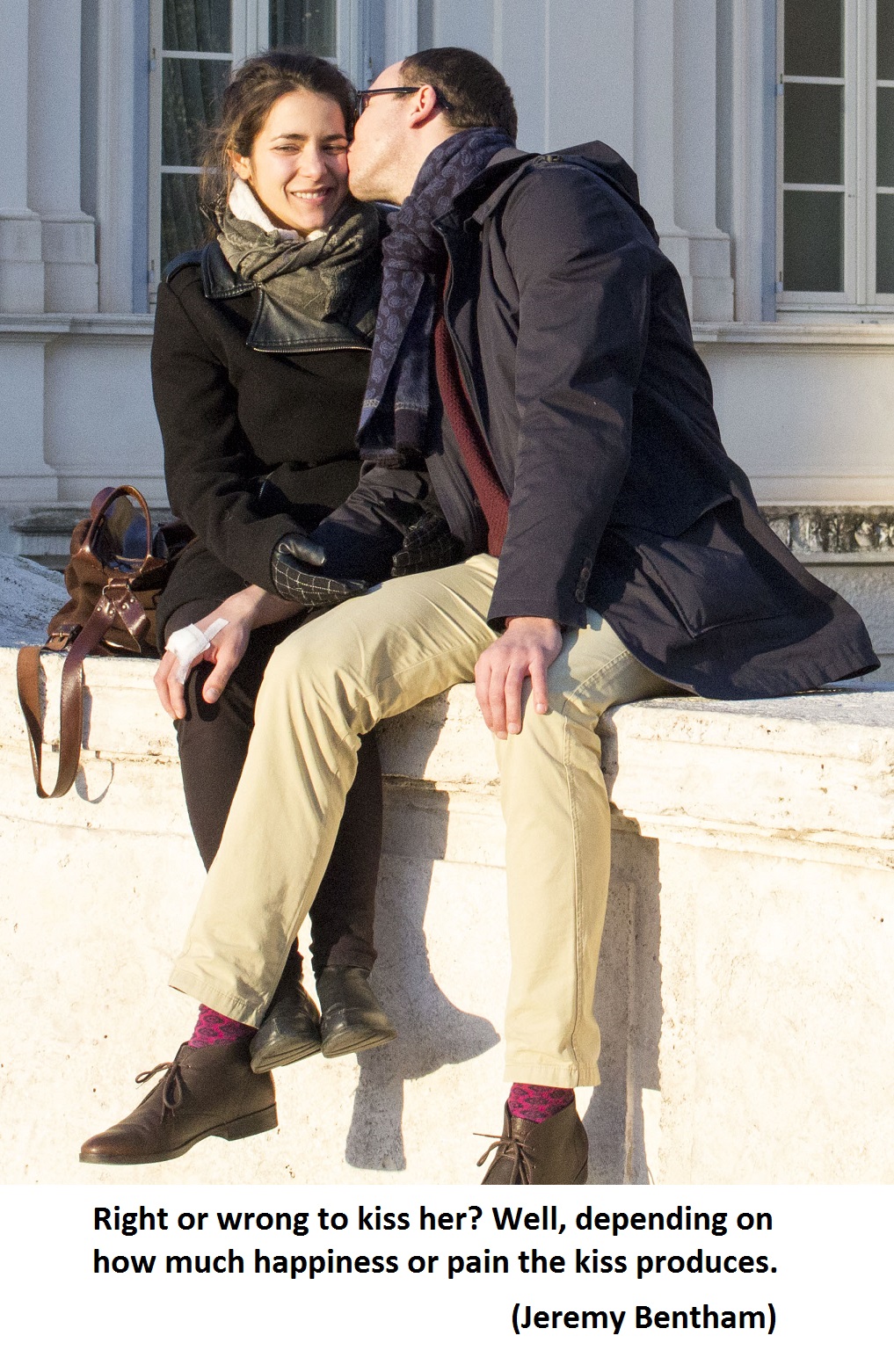 IV. The interest of the community is one of the most general expressions in the language of morality – no wonder that its meaning is often lost. When it has a meaning, it is this: The community is an imaginary body, composed of the individual persons who are considered its members. What is, then, the interest of the community? It is the sum of the interests of the individual members who compose it.
IV. The interest of the community is one of the most general expressions in the language of morality – no wonder that its meaning is often lost. When it has a meaning, it is this: The community is an imaginary body, composed of the individual persons who are considered its members. What is, then, the interest of the community? It is the sum of the interests of the individual members who compose it.
VI. An action may be said to agree with the principle of utility […] when its tendency to increase the happiness of the community is greater than its tendency to decrease it.
IX. A person is a supporter of the principle of utility, when his approval or disapproval of any action is determined by, and proportional to, the tendency which he thinks the action has to increase or decrease the happiness of the community. Or, in other words, to its agreement or disagreement with the laws of utility.
X. We may say this about an action which agrees with the principle of utility: Either it is an action that ought to be done, or at least it is not an action that ought not to be done. One may also say that it is right – it should be done; or at least that it is not wrong to do it. That it is a right action, or at least that it is not a wrong action. When interpreted this way, the words “ought,” and “right” and “wrong,” and others of that kind, have a meaning. If not, they have no meaning.
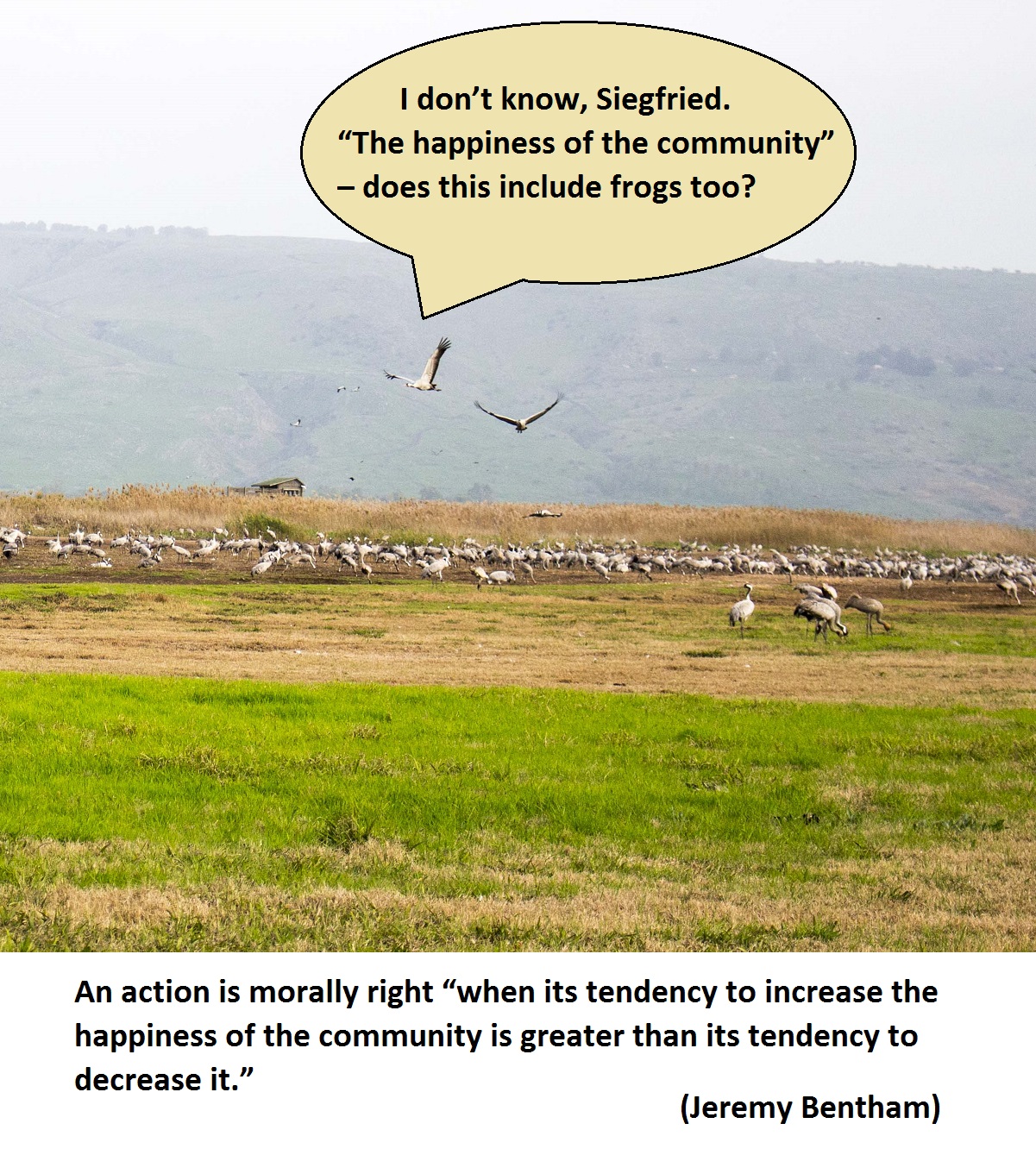
IMMANUEL KANT
Act from a sense to duty
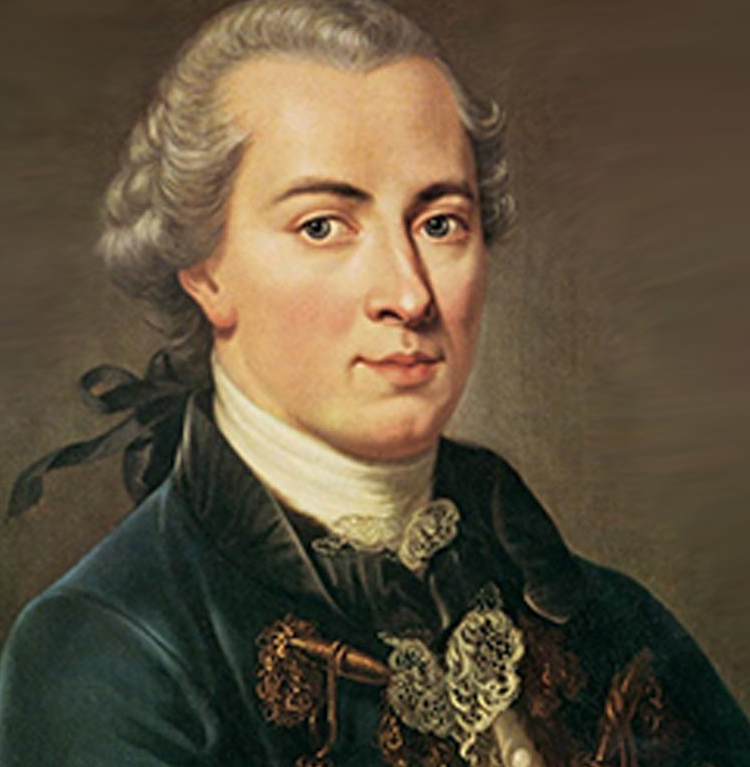 The German philosopher Immanuel Kant (1724-1804) was one of the most important figures in modern philosophy. He was born in Königsberg, Prussia, where he lived most of his life and where he died. His education as a child was strict and religious. He studied the classics, then philosophy at the University of Königsberg. He started teaching there as a minor instructor, while publishing several scientific works. He eventually succeeded to become a professor of logic and metaphysics at the age of 46. Only then did he encounter the works of David Hume, the British philosopher, which shook him with their apparent skepticism. In response, he published in 1781 his first major book (Critique of Pure Reason), and in the next decade several other important books on several philosophical topics such as metaphysics, epistemology, and ethics. He became internationally famous, and retired from the University of Königsberg at the age of 72. He never married, but was socially active and a popular teacher. He died after physical and mental decline at the age of 79.
The German philosopher Immanuel Kant (1724-1804) was one of the most important figures in modern philosophy. He was born in Königsberg, Prussia, where he lived most of his life and where he died. His education as a child was strict and religious. He studied the classics, then philosophy at the University of Königsberg. He started teaching there as a minor instructor, while publishing several scientific works. He eventually succeeded to become a professor of logic and metaphysics at the age of 46. Only then did he encounter the works of David Hume, the British philosopher, which shook him with their apparent skepticism. In response, he published in 1781 his first major book (Critique of Pure Reason), and in the next decade several other important books on several philosophical topics such as metaphysics, epistemology, and ethics. He became internationally famous, and retired from the University of Königsberg at the age of 72. He never married, but was socially active and a popular teacher. He died after physical and mental decline at the age of 79.
The following text is adapted from Kant’s book Groundwork of the Metaphysics of Morals (1785), a central book in modern and contemporary philosophy of ethics. Kant argues here that what makes an action morally right is not its result (or intended result), as utlitarianists such as Bentham and Mill believe. This is because the same result can be achieved in an evil way. The only thing that is completely and unconditionally good is the good will. Therefore, what makes an action morally right is that the person does it with good will. But what is good will? Kant’s answer is that it is the intention (or will) to follow a moral duty, or “imperative.” But what is the moral imperative? Kant believes that there is one general moral imperative, and he gives it three formulations which he thinks are equivalent. The quotation below mentions two of these three formulations.
From Section 1
It is impossible to think of anything at all in the world – or indeed even beyond it – that could be considered good without qualification, except for a good will. Understanding, wit, judgment, whatever we call these talents of mind, or courage, resolution, perseverance, as qualities of temperament – all these are undoubtedly good and desirable in many respects. However, they can also be extremely evil and harmful if the will which uses of them, and which constitutes the person’s character, is not good. […] A good will is good not because of what it produces, and not just because it can achieve a certain goal, but simply because of the willing itself. In other words, the good will is good in itself…
[…]
Therefore, the moral value of an action does not depend on the result expected from it, nor on any principle of action that involves the motivation to achieve this expected result. Because all these results […] could have been produced by alternative causes, so that the will of rational beings would not be necessary, whereas the highest and unconditional good can be found only in such a will. The distinguished good which we call “moral” can therefore consist only of the conception of a [moral] law in itself – something that is certainly possible only in a rational being […].
But what kind of law can this be, that would guide the will even regardless of its expected results, so that the will would be called good absolutely and without qualification? Since I have excluded the possibility that the will would be motivated by satisfaction arising from obeying the law, there remains nothing but the conformity of actions with a universal law, and only this would serve as the principle guiding the will. In other words: Always act according to the principle which you could want to become a universal law.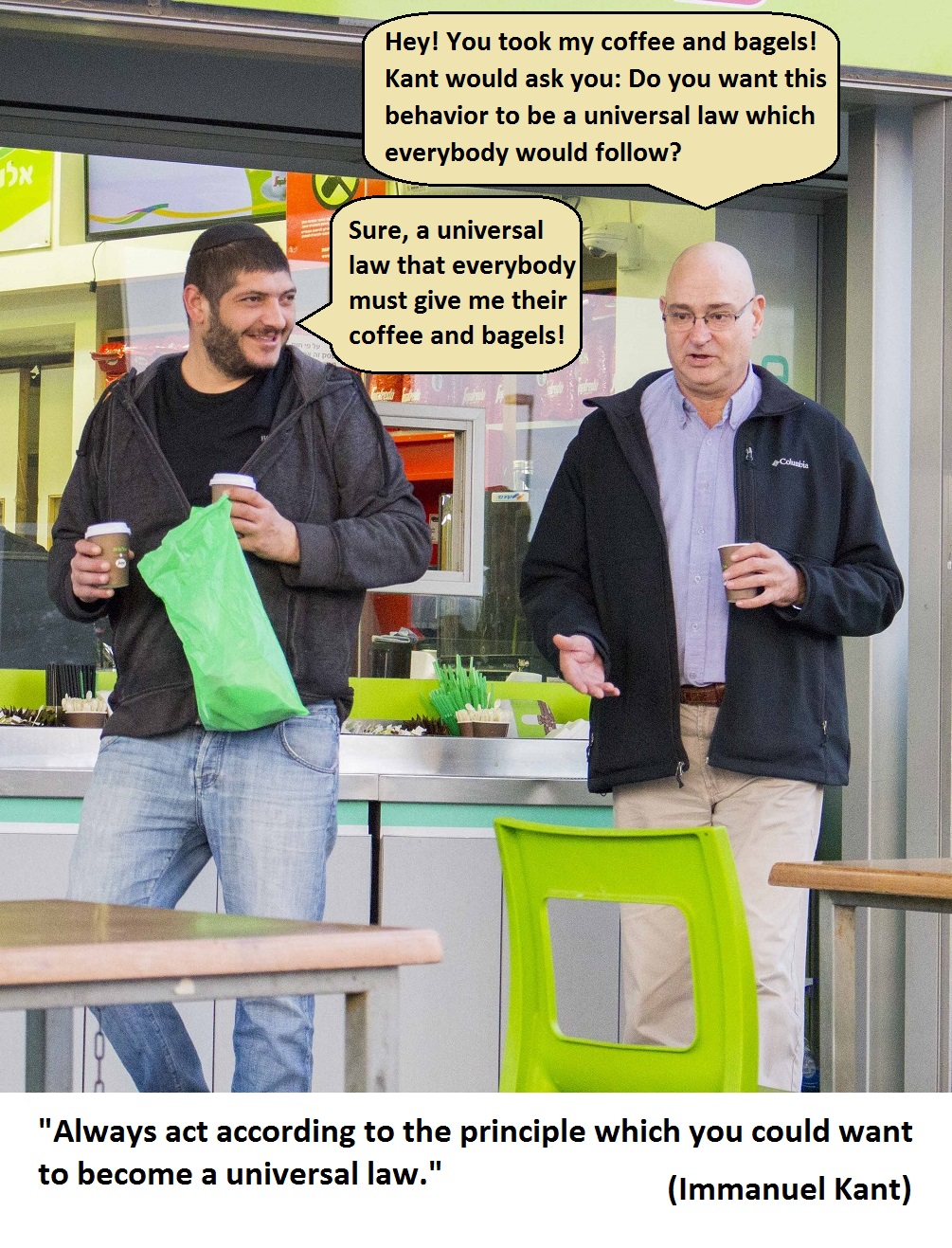
Here it is the mere conformity with law in general, without assuming any particular law that applies to particular actions, that serves as the principle that guides the will. And it must be like that if duty is not to be an empty delusion and a chimerical concept. People’s common reason in its practical judgments perfectly agrees with the principle I suggested, and always has it before its eyes.
[…]
From Section 2
Now I say that a human being – and in general every rational being – exists as an end in itself, and he is not just a means that can be used by some will for its own purpose. Instead, the human being must always be regarded also as an end, in all his actions, whether they concern him or any other rational beings.
[…]
If there is a supreme practical principle, or categorical imperative, then since it necessarily applies to everyone because everyone is an end in itself, this principle would be an objective principle of the will, and it could therefore serve as a universal practical law. The foundation of this principle is: Rational nature exists as an end in itself. The human being necessarily understands his own existence in this way – so far it is thus a subjective principle of human actions. But every other rational being also understands his existence in this way, just on the same rational principle that holds for me. Therefore, it is at the same time an objective principle, and as a supreme practical ground it must determine all the laws of the will. Therefore, the practical imperative will be as follows: Act in such a way that you would always use humanity, whether in yourself or in any other person, also as an end, and never just as a means.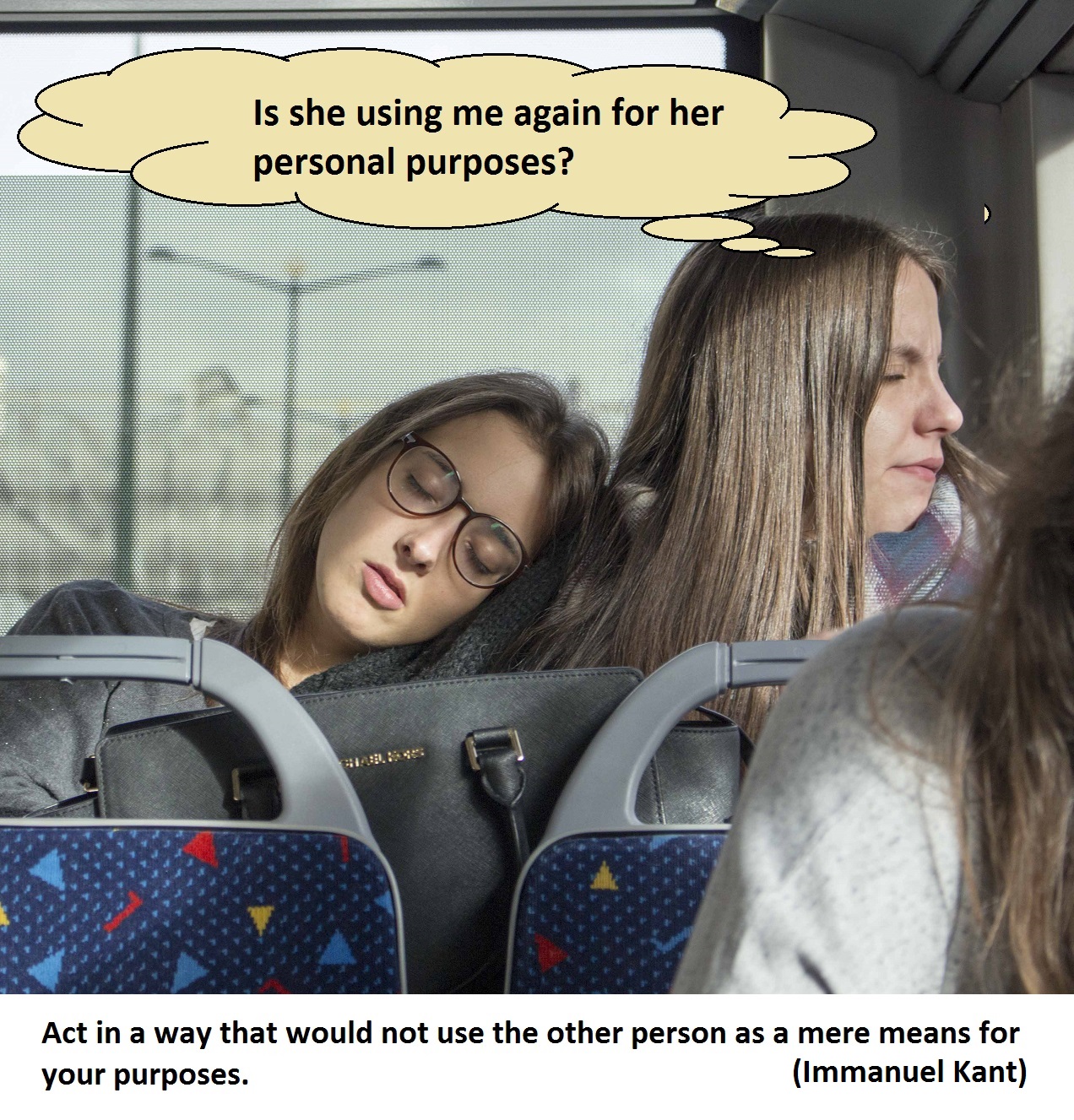
FRIEDRICH EDUARD BENEKE
Morality expresses the ideal human essence
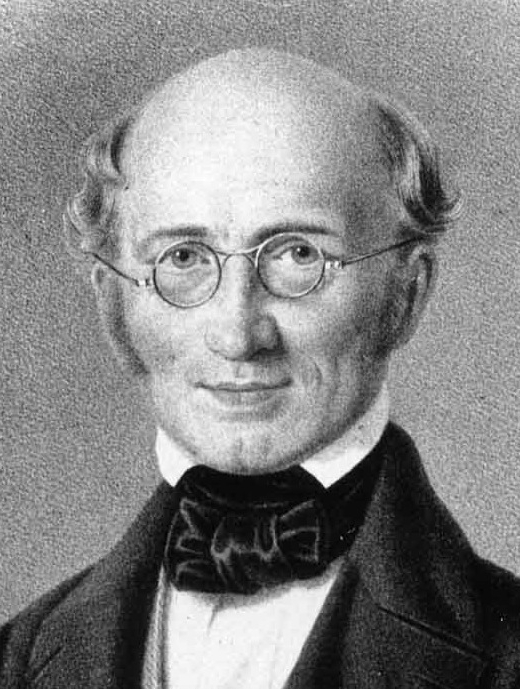 Friedrich Eduard Beneke (1798-1854) was a German philosopher who struggled against the philosophical norms of his time, and throughout his life was persecuted for his views by academic and political authorities. He studied philosophy at the University of Berlin with the feeling that his mission was to open a new path for philosophy. In his dissertation, the 24-year old Beneke passionately attacked Kantian philosophy, arguing against Kant’s idea of apriori knowledge. Instead, he argued, the root of all knowledge must be empirical psychology. From this perspective he also attacked the philosophies of Hegel and Fichte, two influential and powerful professors at the time. In 1822 his lectures at the University of Berlin were stopped by the authorities. In response, for many months he contacted many academic and political figures to try to cancel this decision. He did this with remarkable persistence, but without success. It seems that Hegel himself was behind the attempt to silence the young thinker. When the University of Jena showed interest in Beneke, the Grand Duke did not allow his employment. Only in 1824 did he manage to find work as a philosophy professor at the University of Gottingen, where he wrote some of his main books. Three years later he was given permission to continue teaching at the University of Berlin. He returned to Berlin, but once again was attacked by many critics.
Friedrich Eduard Beneke (1798-1854) was a German philosopher who struggled against the philosophical norms of his time, and throughout his life was persecuted for his views by academic and political authorities. He studied philosophy at the University of Berlin with the feeling that his mission was to open a new path for philosophy. In his dissertation, the 24-year old Beneke passionately attacked Kantian philosophy, arguing against Kant’s idea of apriori knowledge. Instead, he argued, the root of all knowledge must be empirical psychology. From this perspective he also attacked the philosophies of Hegel and Fichte, two influential and powerful professors at the time. In 1822 his lectures at the University of Berlin were stopped by the authorities. In response, for many months he contacted many academic and political figures to try to cancel this decision. He did this with remarkable persistence, but without success. It seems that Hegel himself was behind the attempt to silence the young thinker. When the University of Jena showed interest in Beneke, the Grand Duke did not allow his employment. Only in 1824 did he manage to find work as a philosophy professor at the University of Gottingen, where he wrote some of his main books. Three years later he was given permission to continue teaching at the University of Berlin. He returned to Berlin, but once again was attacked by many critics.
Beneke lived a simple life, and was admired by a small circle of friends and followers. Several writers noted that he was kind even to his many enemies. In 1854 he suddenly disappeared, and two years later his body was discovered in a canal. His death remains a mystery, and may be related to his insomnia, or may have been suicide.
Beneke represents the philosophical approach which tries to base philosophical ideas on psychological facts (as opposed to basing them on a priori, conceptual, or logical considerations). This approach is called “psychologism,” especially by its opponents, as a negative word that implies a confusion between psychology and philosophy. In fact, the term “psychologism” was invented specifically against Beneke. Psychologism had some following in 19th century Germany, but some important philosopher, such as Frege and Husserl, rejected it. It is close in spirit to contemporary approaches such as naturalism.
The following text is adapted (with minor simplifications) from Beneke’s book Foundations of the natural system of practical philosophy (1837). Here Beneke argues that the morally right or wrong is a universal value that is based on basic structures of human psychology. But he is not talking about the psychology of ordinary people (otherwise morality wouldn’t be universal, since different people have different psychological tendencies). Rather, morality is based on an IDEAL psychology, the psychology of a person who is fully and perfectly developed. Many people, of course, do not have a fully developed character, so their actual psychology does not correspond to what is morally right. But when we are aware of ourselves, we experience the command to be moral in accordance with the ideal structures. The moral command is, then, the command to return to our original psychological structure, and in this way to fulfill our human nature.
But what is true or right, and what is the universal and necessary nature of good and evil? As I have just said, we should reply here: It is what comes from the fundamental essence of human nature, and is conditioned by it. The demands of morality are in complete harmony with what is natural, if we regard them in their original purity. Or (from a different point of view), moral commands, however ideal they may be, are nevertheless given to us as natural products of the human spirit. The soul, therefore, by virtue of its deepest nature, must contain in itself the principles that underlie these moral commands. But what are these principles?
[…]
It is so evident, beyond any need of argument, that moral consciousness cannot be reduced to egoistic interests, either in the case of the individual, or even in the case of the state, which is also an individual in the form of a group. If such an argument may be still be needed today, I have already given it elsewhere. I have shown that limiting ourselves to what is beneficial or harmful to us should definitely be rejected as immoral. Likewise, the theory that the well-being of others can motivate us only if it impacts us, and that it must therefore be based on our own well-being or on a selfish interest – this theory is based on a psychological error. […] We are not limited to egoistic structures, but on the contrary, we experience an enlargement of our being towards others, and an absorption of others into our own being, so that we respect their being for its own sake and independently of our self-concern. The highly developed moral consciousness demands this altruism with an authority that cannot be questioned.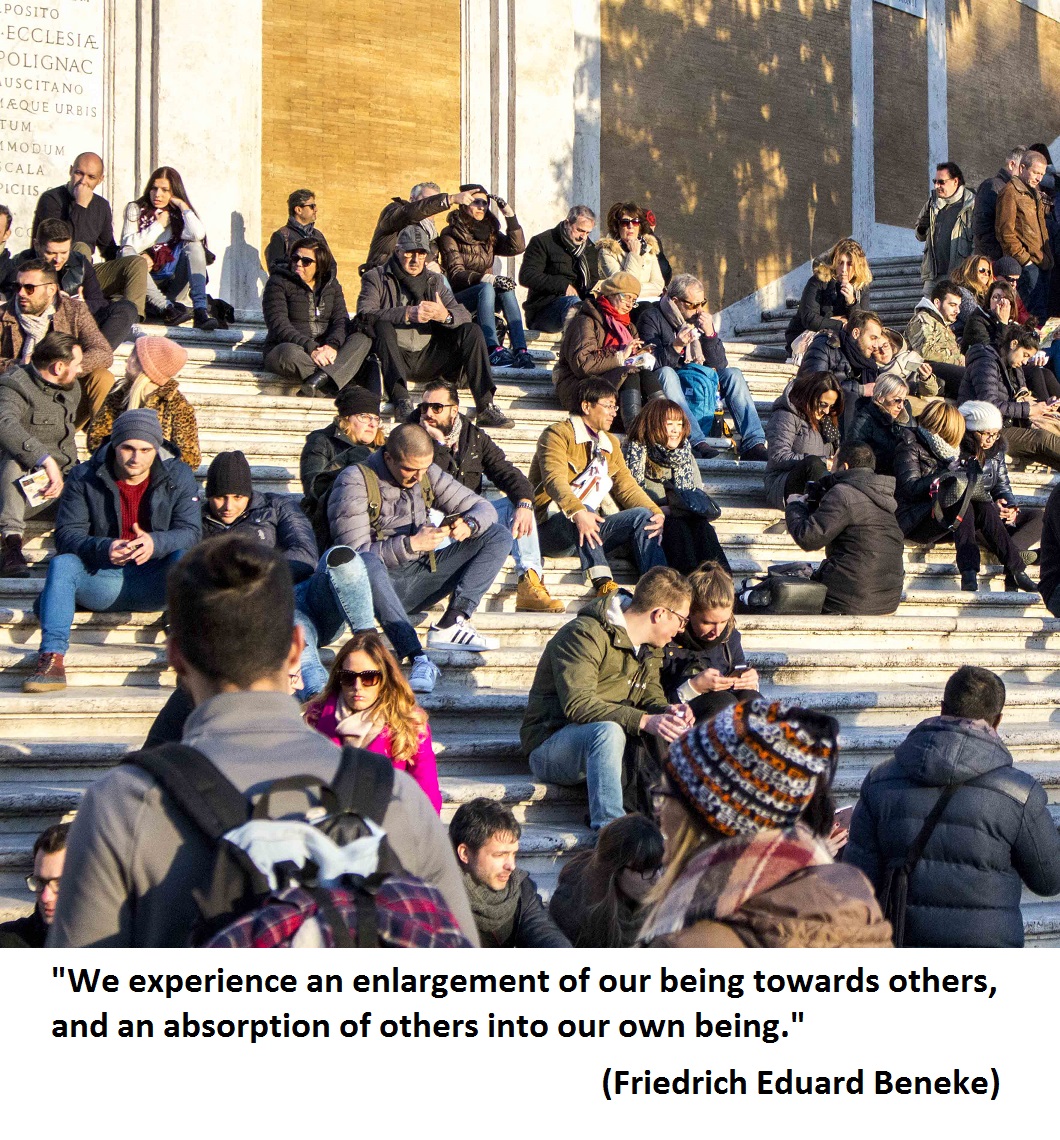
[…]
And it is just here that psychology reveals itself as the underlying science of morals; or (if I am permitted to use the expression), as the mathematics of morals. The analysis of the moral phenomenon represents nothing that is new, and nothing that has not from the beginning existed in the moral consciousness. If it tried to do this, it would be untrue, since it would falsify the moral consciousness by putting something foreign in it.
[…]
We can now present in the clearest light the necessary and universal validity of moral duties, which until now we have been forced to leave in a certain obscurity. What does it mean when we say that everyone must value the intellectual more highly than the sensory, and the well-being of the community more highly than one’s own limited well-being? […]
I answer: The universal validity comes from the fact that the moral scale [bad and good] is inherent in all humans in the same way, through the fundamental structure of their practical development. But besides these fundamental structures, there also exist other structures which can prevent and destroy this development. And if this happens, the result is that the universal endowment, and other inborn endowments, are nevertheless not universal in practice, and are not manifested in people’s behavior in the same way. And this also limits the necessary nature of morality. Moral necessity is, of course, to some degree a natural necessity, and it belongs to the deepest natural structures of our practical development. But this is the necessity of a natural development that is uninterrupted and pure (and, one might say, ideal), and in this respect it is only a limited and conditional necessity. Under corrupting influences, however, and in contrast to them, that original necessity of nature does not fully express itself. When these corrupting influences become known to us, that purer development becomes a moral command that is imperative for anyone who wants to be a human being in the higher sense of this word, or who seeks to represent in himself the fundamental norm of human nature in its purity.
DAVID ROSS
The intuition of right and wrong
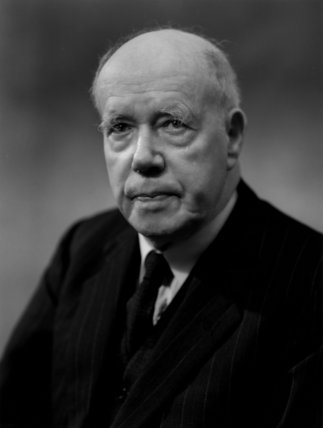 Sir William David Ross (1877-1971), commonly called David Ross, was a Scottish philosopher and classicist. He studied classical studies at the University of Edinburgh, then studied at Oxford University, where he remained a professor for the rest of his career. He became famous at the time for his contribution to classical studies, philosophy of ethics, and his work on Plato, Aristotle, and Kant. He translated into English the complete works of Aristotle, and was president of the Aristotelian Society. He died at Oxford in 1971 at the age of 94.
Sir William David Ross (1877-1971), commonly called David Ross, was a Scottish philosopher and classicist. He studied classical studies at the University of Edinburgh, then studied at Oxford University, where he remained a professor for the rest of his career. He became famous at the time for his contribution to classical studies, philosophy of ethics, and his work on Plato, Aristotle, and Kant. He translated into English the complete works of Aristotle, and was president of the Aristotelian Society. He died at Oxford in 1971 at the age of 94.
The following text is adapted (several sentences simplified) from Ross’ important book The Right and the Good (1930). Ross is a representative of so-called “Intuitionist ethics,” which was a major approach to ethics in British philosophy for two centuries until the 1930s, and recently has started to gain some acceptance again. Intuitionism is based on two basic ideas: First, the rightness of an action is something we perceive through direct intuition, without reasons or proofs. Second, the rightness of an action is an objective quality which is “non-natural” (in other words, it cannot be translated into “natural” qualities such as pleasure). Thus, telling the truth is morally right because the act of telling the truth has a non-natural quality of rightness, which we can perceive through a special moral intuition.
In the following text, Ross presents his distinctive version of intuitionism. For him, we cannot intuit whether an action is morally right or wrong, we can only intuit whether it is PRIMA FACIE right. By prima facie right Ross means that it has a “tendency” to be morally right, or more accurately, that it is “conditionally” right – it is right ON CONDITION that something else does not make it wrong. For example, an act of telling the truth is morally right, on condition that it would not cause the death of an innocent person. Therefore, telling the truth is morally right only conditionally, only in a prima facie way. Our moral intuitions, according to Ross, can tell us which actions have a moral value – which of them are prima facie right or wrong, but they cannot tell us which actions are really right or wrong. For example, when a given action is both prima facie right (because it is telling the truth) and prima facie wrong (because it causes harm), we can never be certain which prima facie value is stronger. We can only have an opinion, but never know for sure whether the action is really right.
This view that morality has no strict general laws, and that every case is unique, is called ethical pluralism. Not all intuitionists are pluralists: Unlike Ross, some philosophers believe that we can intuit strict moral laws.
From Chapter II: WHAT MAKES RIGHT ACTS RIGHT?
It is evident that an act, because it is fulfilling a promise, or because it is creating a fair distribution of good, or returning services given to me, or promoting the good of others, or promoting my virtue or insight – it is self-evident that such an act is prima facie right (conditionally right). It is self-evident not in the sense that it is evident from childhood, or the moment we attend to the statement for the first time, but in the sense that when we reach sufficient mental maturity and give sufficient attention to the statement, it is evident without any need of proof or of evidence. The moral order expressed in these statements is part of the fundamental nature of the universe, just like the spatial or numerical structure expressed in the axioms of geometry or arithmetic. In our confidence that these statements are true, there is the same trust in our reason as there is in our confidence in mathematics. And we have no justification for trusting our reason in the second sphere and distrusting it in the first sphere. In both cases, we are dealing with statements that cannot be proved, but that just as certainly need no proof.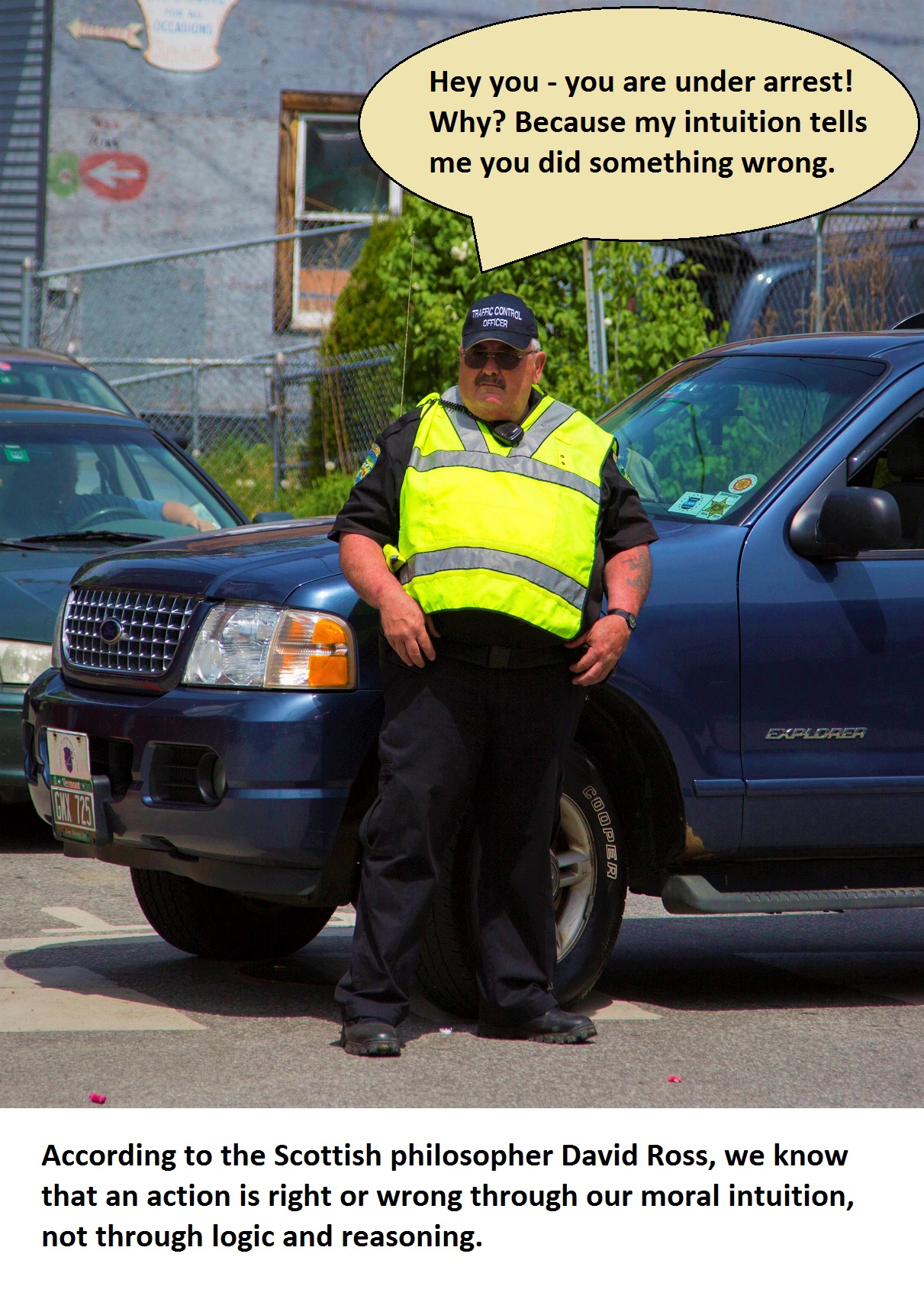
[…]
Our judgements about our ACTUAL duty in CONCRETE situations don’t have the certainty that exists in our recognition of the GENERAL principles of duty. […] When a possible act has two characteristics, one which makes the act prima facie right, and the other prima facie wrong, we are aware that we are not certain whether we should or should not to do it. We are aware that whether we do it or not, we are taking a moral risk. In the long-term, after consideration, we come to regard one duty as more important than the other, but we do not feel certain that it is so. […] In this respect, the judgement of the rightness of a particular act is just like the judgement of the beauty of a particular natural object or work of art. A poem is, for instance, is beautiful in terms of certain qualities and is not beautiful in terms of other qualities. And when we judge the degree of its beauty on the whole, we never do so by logical reasoning from its particular beauties or particular defects. Both in the aesthetic case and in the moral case, we have more or less probable opinions which are not logically justified conclusions from the general principles that we recognize as self-evident.
[…]
The general principles of duty are obviously not self-evident from the beginning of our lives. How do they come to be so? The answer is that they come to be self-evident to us just like mathematical axioms. We find by experience that this couple of matches and that couple of matches make four matches, that this couple of balls and that couple of balls make four balls. And by reflection on these and similar discoveries, we come to see that it is the nature of two and two that together they make four. In a precisely similar way, we see the prima facie rightness of a particular fulfillment of a promise, and we see the prima facie rightness of another fulfillment of a promise, and when we reach sufficient maturity to think in general terms, we apprehend that fulfilling a promise has prima facie rightness.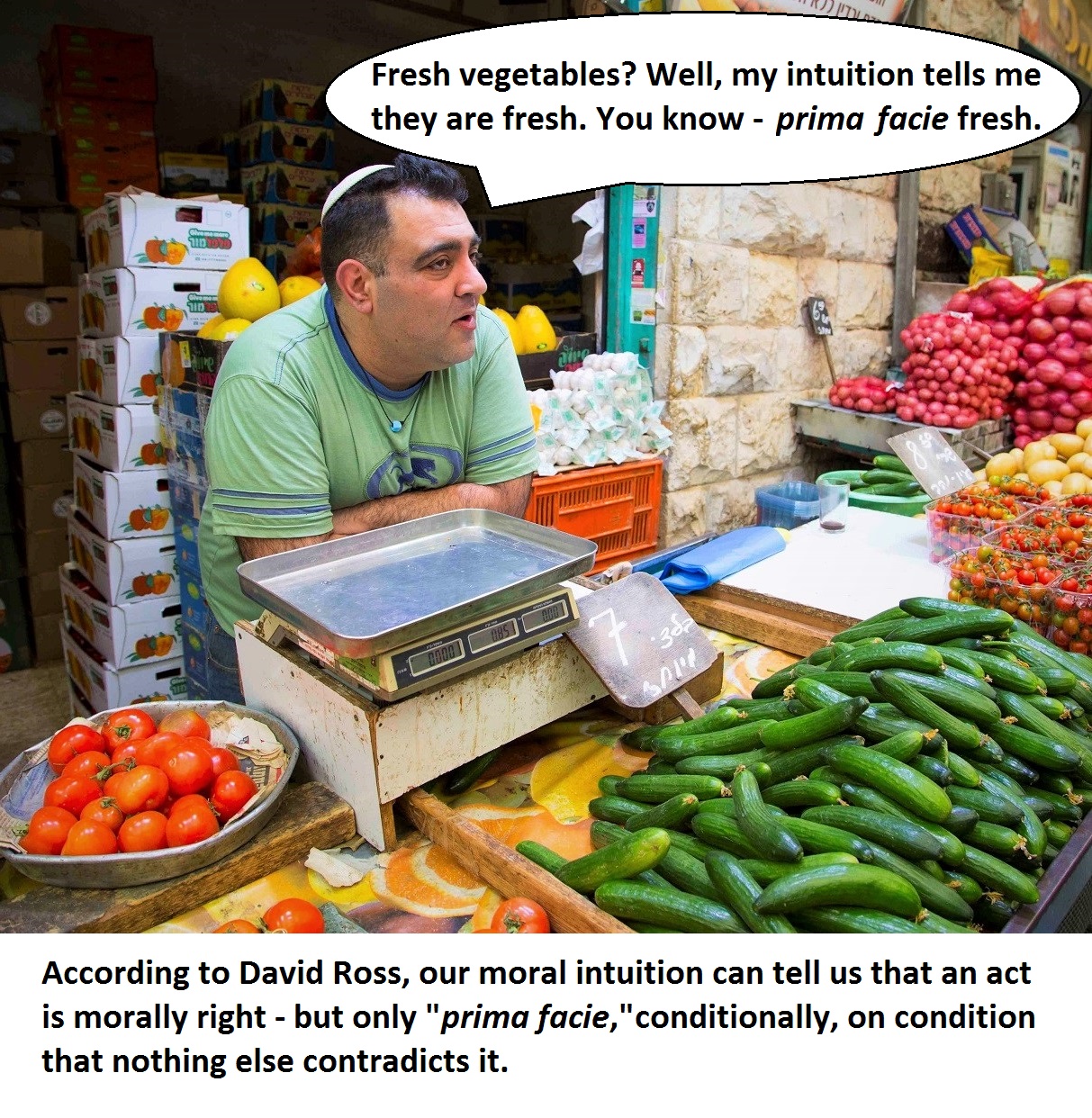
- Authenticity